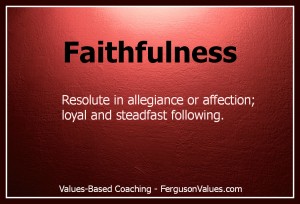How a Husband and Wife can Develop Faithfulness in their Marriage
The value of faithfulness means resolute in allegiance or affection; loyal and steadfast following.
Marriage Questions:
- What does resolute in allegiance mean to you?
- How do you know when you are being loyal and steadfast?
- Who do you know that has demonstrated loyalty in their marriage in spite of all odds?
3 Features of Faithfulness
Think of some of your favorite stories that include a hero and/or heroine, maybe from a book or movie. When you consider the characters in a story that demonstrate faithfulness, then there is something special to be admired. It’s easy to respect them. You might even respond with a renewed conviction yourself.
Digging a little deeper, there are three important features of faithfulness: purity, power, and promise. These can best be explained by the following stories.
The Lord of the Rings is one of the best stories of all time. Samwise (Sam) Gamgee is the valuable sidekick who proves his loyalty to the main character of Frodo Baggins over and over again. At one point, Sam says: “I made a promise, Mr. Frodo. A promise. Don’t you leave him, Samwise Gamgee. And I don’t mean to. I don’t mean to.” Now that’s a noteworthy statement!
But what is even more impressive is that Sam lives up to his commitment. He willingly endures much physical pain. He endures the mental anguish of failure, believing Frodo is dead (when he is not). At one point, Sam is even openly rejected by his friend, Frodo. But Sam never quits. He never gives up. He never abandons his mission, or his friend.
Here, the character of Sam demonstrates the purity of faithfulness. Even in pain, sorrow, or rejection, one never quits.
The Princess Bride is an outstanding fantasy that combines romance, comedy, and adventure. Westley is a poor farm-boy who loves the beautiful maiden, Buttercup. When Westley leaves to seek his fortune so he can afford to marry Buttercup, he vows to return to her. But his ship is attacked and Buttercup believes her Westley is dead. Five years later, as Buttercup is preparing to marry Prince Humperdinck, Westley shows up, disguised as ‘the man in black.’
When Westley expresses his disappointment in Buttercup not waiting for him, she says she believed he was dead. Westley responds: “Death cannot stop true love. All it can do is delay it for a while.” That’s another noteworthy statement!
Here, the character of Westley highlights the power of faithfulness. Even death cannot stand in the way of proving one’s faithfulness.
The Notebook is a beautiful love story about a couple that fall in love during the early 1940s and what happens when they grow old. We see Duke, now an elderly man, in a nursing home reading a romantic love story from his notebook to an elderly woman and fellow patient. We later learn that the elderly woman is in fact his wife, Allie, who is suffering from dementia and cannot remember any of the events being read to her. She doesn’t even recognize her husband, Duke (whose real name is Noah).
Their visiting children tell Duke that he needs to accept the fact she can’t remember anymore. But Duke tells them the more he reads to their mother, the more she’ll remember and he won’t give up on her. At various points, Allie appears to remember a bit, including the face of her husband. At one point she asks him: “Do you think that our love can create miracles?” To which Duke responds: “Yes I do, that’s what brings you back to me each time.”
Here, the character of Duke highlights the promise of faithfulness. Even when it appears there is no hope, faithfulness prevails.
So how do a husband and wife develop faithfulness in their marriage? It starts by understanding the purity, power, and promise of the value of faithfulness. Then it’s a decision each one of us makes. Inside.
How can the value of faithfulness help improve your marriage?
Today’s value was selected from the “Fairness-Respect” category, based on the e-book Developing Your Differentiating Values.









I appreciate your examples and how you’ve fleshed this out for us in real and descriptive ways, Robert. These are inspiring examples of remaining true and believing the best about our friend/spouse. I think that’s the way I need to improve my faithfulness to my spouse–believing the best about him at all times. I don’t do that often enough. Thanks for this thought-provoking post.
Beth, thanks for your kind comments. The values of optimism and loyalty that Lori and I share naturally came through on this post.